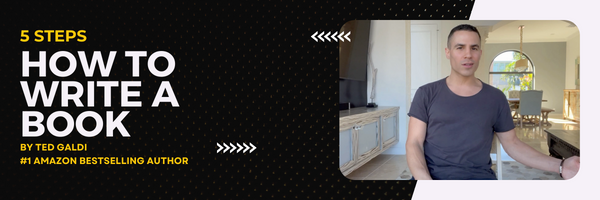How to Write a Book: 5 Steps for BeginnersInterested in writing your first book? Below are 5 key steps on how to write a book for beginners. To outline an awesome story, download my FREE guide How do you write a book with no experience?If you have no storytelling experience, that's okay. Since you have an interest in writing a book, chances are you enjoy reading. And reading makes for a great starting point... How To Write a Book Step #1: Tap into what you like to readDo you like reading crime thrillers? Maybe sci-fi? Romance? If you want to write a book, tapping into your interests as a reader is a great first step. Chances are you've read at least a handful of books in your favorite genre and have a sense for the types of characters and conflicts that make for its best stories. You should set out to tell the type of story you'd be a potential reader of. When the time comes to write it, you'll have an intuitive feel for what's working and what isn't. You just imagine you're a reader and ask yourself if you'd keep turning the pages. How To Write a Book Step #2: Put your personal stamp on the genreOnce you've picked your genre, your story should stay true to the expectations readers of the genre have. For instance, in a mystery novel, some crime should happen toward the beginning that your main character must solve. Though you want your story to keep within the traditions of your genre, you also want it to be unique. There's only one of you. So, for your story to be unique, simply look at what you find intriguing about the world. Two helpful categories to think about are people and situations, since these can be naturally shaped into characters and plot. What's a type of person that interests you? Maybe people who explore caves have always fascinated you. Your mystery novel could open up with your main character climbing through a cave with a couple friends and coming across a dead body. What's a situation that interests you? Maybe you've always wondered what would happen if someone stole a famous painting from a museum. Sounds like a solid premise for a thriller. How To Write a Book Step #3: Learn the elements of storytellingOnce you identify your favorite genre and some people and a situation that you find intriguing, your foundation will be set. However, that's not enough to put together a captivating story with a beginning, middle, and end. Fortunately, doing that can be straightforward if you have insight into the four key elements of storytelling:
How To Write a Book Step #4: Outline your storyOnce you have an understanding of characters, plot, theme, and emotion, you should be ready to outline your story. An outline is a document that captures the major events in your novel from the beginning, through the middle, through the end. In my How To Write Gripping Stories online course, I provide a blueprint guide that makes outlining your novel simple. Some questions your outline should answer:
How To Write a Book Step #5: Write your chaptersOnce you've got your book outlined, your next step is to start writing your chapters. The minimum length for a novel is considered to be 60,000 words. I realize that may sound like a lot, however, if you break the process into smaller steps, it'll seem manageable. Writing 500 words a day is a great goal. That's two pages, double-spaced. Pretty doable, even for a beginner. Let's say you get into a good, consistent routine and you're knocking out your 500 daily words. In only 120 days - just 4 months - you'll have the first draft of your book completed. Let's say you miss a day here and there, but still stay pretty consistent, you're looking at maybe 5 months till a first draft. Not too long, and not too much required of you per day. Once you finish the first draft, start at the top, read through it, and edit things that seem off. On this second draft, make sure your characters and conflicts are interesting and your sequence of events makes sense, ex fix any plot holes you may notice. I'd recommend a third draft, where your focus can get a bit narrower. Tighten up your dialogue and descriptions, removing any sentences that aren't necessary for characterization or plot development. You can also keep your eye out for issues with spelling and grammar. Learning how to write a book entails a lot more education than reading one article. Various guides are dedicated to scene structure, dialogue, editing, and any other writing topic out there - I'd suggest you start checking them out. This post focuses on writing a novel, however, narrative non-fiction books follow many of the same principles. You might want to have a look at my article on the types of narrative writing. If you're new to writing, you also should learn how to market a book online and how to write a short story. Download my FREE story-outlining guide:
0 Comments
Leave a Reply. |


 RSS Feed
RSS Feed